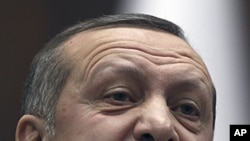As Turkey increasingly tries to play the role of broker in Mideast diplomacy, there are concerns its conservative Muslim prime minister is pursuing a religious agenda. But in a speech this week, Prime Minister Recep Tayyip Erdogan denied he is advocating regional policies along sectarian lines.
Turkish Prime Minister Recep Tayyip Erdogan has worked in his decade-long leadership towards closer relations within the Middle East, especially among the two dominant sects of Islam Sunni and Shi'ite.
Turkish foreign policy expert Soli Ozel says though Turkey's Muslim population is overwhelmingly Sunni, the government has played the role of mediator between both Sunnis and Shi'ites across the region.
"Turkey tries to present itself as more of an ecumenical force than a sectarian force. Therefore, it wishes to be able to speak to all sides -- the Sunni, Shi'ia and Kurd alike, rather than take sides with the Sunnis. Because if it does that, then it will be part of the division between Shi'ia and Sunni, which is going to take this region to (an) even more hellish situation than exists today," Ozel said.
The Middle East is divided between followers of the Shi'ite and Sunni sects of Islam. Iran is the largest Shi'ite state, and the leadership of both Iraq and Syria are also Shi'ite.
Ankara in the last month has strongly criticized Iraq's prime minister, Nouri al-Maliki, for what it says is a policy of targeting the country's Sunni minority. With Syria, Ankara has strongly opposed President Bashar al-Assad's crackdown on the opposition, which is mainly Sunni.
Sinan Ulgen, a former senior Turkish diplomat and research fellow of the U.S.-based Carnegie Institute, says while the policies can be seen as supporting democracy in Syria and stability in Iraq, they are also viewed through the prism of religious sectarianism.
"There are reports coming out of the region essentially portraying Turkey, or accusing Turkey, of playing the Sunni card. And in this particular case, of course perception matters even more than reality," Ulgen noted.
Diplomatic tensions have been rising between Turkey and Iran, which until recently enjoyed close relations with Turkey. In addition to its opposition of Tehran's close ally, Syria, Turkey infuriated the Iranian leadership with a decision to deploy NATO radar as part of a missile defense system primarily aimed at Iran.
Still, in a speech to his deputies, Erdogan on Tuesday denied his government is following a sectarian agenda to support Sunni aims.
He said his government is neither against nor behind any sect, and that those who perceive its policies as interference should first look at themselves. He said Turkey does not discriminate and does not base its policies on what he called "artificial elements."
Erdogan also said his government is planning to organize a regional meeting of Sunni and Shi'ite leaders later this month aimed at defusing regional tensions.
Last month, Turkey offered to host an international gathering aimed at resolving growing tensions over Iran's controversial nuclear program, which is suspected of being used to develop atomic weapons.
Researcher Ulgen says Ankara knows religious sectarianism could further destabilize the Middle East. "The polarization of sectarian tensions would essentially mean long years of instability in the region -- whether it's Iraq, whether it's Syria, whether it's Lebanon -- and these are very heterogeneous societies. And if sectarian tensions are on the rise, it's going to be much more difficult to bring and peace and stability to these societies," Ulgen stated.
Still, observers warn divisions in the Middle East are increasing along sectarian lines. And helping to resolve that divide poses a major diplomatic challenge to Turkey.
Turkey Tries to Navigate Sectarian Divides in Middle East











